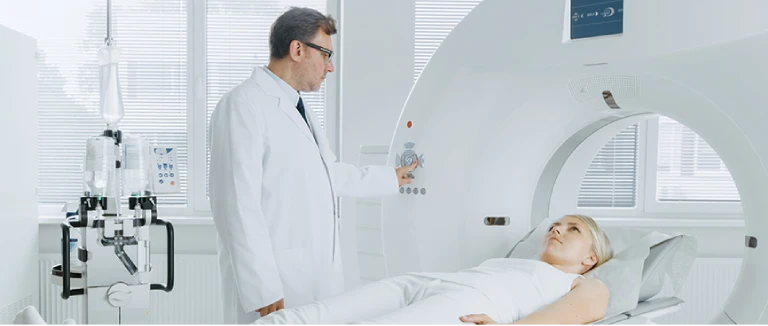Understanding Radiotherapy Treatment and Its Role in Cancer Care
Although the global incidence of cancer continues to rise, remarkable progress in medical science and technology has introduced new treatment methods that bring renewed hope to patients. Among these, Radiotherapy Treatment has long been one of the most essential and effective treatment options. Liv Hospital Radiation Oncology Specialist Professor Dr. Merdan Fayda explains the principles, process, and impact of Radiotherapy Treatment in cancer management.

What Is Radiotherapy Treatment
Radiotherapy Treatment is a medical procedure that uses ionized radiation to eliminate or control cancer cells. The idea may sound complicated, but in daily life, we are already familiar with forms of energy that travel through the air. Devices such as mobile phones, satellite systems, and radios all operate using electromagnetic energy. In medicine, Radiotherapy Treatment applies a similar concept through controlled beams of energy to target and destroy cancerous tissues.
The beams used in Radiotherapy Treatment are ionizing, meaning they have enough power to damage the DNA within cells. This damage prevents cancer cells from dividing and multiplying. Although both healthy and cancerous cells are exposed to radiation, cancer cells cannot repair themselves effectively, while normal cells can recover. Because of this difference, Radiotherapy Treatment has been successfully used to destroy tumors since the late nineteenth century. Modern advances in technology now make it possible to deliver radiation with extreme precision, targeting tumors while minimizing harm to healthy tissues.
What Do Patients Feel During Radiotherapy
A common question patients ask before starting Radiotherapy Treatment is whether they will feel the radiation during sessions. The process itself is painless. Just as patients do not feel the low-energy X-rays used in tomography, the high-energy beams used during Radiotherapy Treatment also pass through the body without sensation. Patients lie on the treatment table while the machine delivers radiation from various angles, and the beams travel through the body at the speed of light. Most sessions last only a few minutes, and patients can resume normal daily activities soon after each Radiotherapy Treatment.
Does Radiotherapy Affect the Patient’s Family or Environment
Families often wonder whether being around someone undergoing Radiotherapy Treatment might expose them to radiation. In most cases, Radiotherapy Treatment is performed externally, meaning the radiation is generated by a device outside the body and directed at the tumor area. The radiation passes through the body and does not linger or accumulate. Therefore, there is no risk of exposure for family members or caregivers.
In another form of Radiotherapy Treatment called brachytherapy, radioactive sources are placed temporarily inside or near the tumor. These sources stay in place only for a short time to deliver targeted doses of radiation, after which they are completely removed. Once the source is removed, no radiation remains in the patient’s body, so it is safe for relatives to be near them.
Preparation Before Radiotherapy
Before beginning Radiotherapy Treatment, patients undergo a detailed evaluation to ensure the treatment is suitable and effective. The process starts with a consultation with a radiation oncology specialist who explains the purpose of Radiotherapy Treatment, its benefits, possible side effects, and how the sessions will be carried out.
Sometimes, diagnostic tests or imaging procedures are performed before Radiotherapy Treatment begins. These tests help doctors identify the exact size, location, and depth of the tumor, allowing them to plan radiation delivery precisely. Each Radiotherapy Treatment plan is personalized according to the patient’s condition and medical history.
How Radiotherapy Duration Is Determined
The duration of Radiotherapy Treatment varies from patient to patient, depending on the type and stage of cancer. Treatment planning begins with computed tomography imaging. During this stage, the radiation oncologist identifies the exact area to be treated and marks it digitally. Together with a medical physicist, the oncologist calculates the correct radiation dose and determines the best angles and intensity for delivery.
These steps are critical for the success of Radiotherapy Treatment because they ensure the tumor receives the full dose while protecting surrounding healthy tissues. Once the planning is completed, the doctor determines how many sessions will be needed. Each session of Radiotherapy Treatment may last only a few minutes, but the full course can span several weeks depending on the treatment plan.
Precautions During Radiotherapy
Throughout Radiotherapy Treatment, patients are closely monitored by their medical team. It is important to follow all recommendations from the radiation oncologist. Patients should report any side effects or new symptoms, such as fever or swallowing difficulties, to the doctor. If other medications are needed during Radiotherapy Treatment, they must be approved by the treating specialist to avoid interference.
Radiotherapy Treatment is always performed under the supervision of trained professionals who monitor both safety and effectiveness. Regular checkups help evaluate progress and ensure that the treatment remains on track.
Nutrition During Radiotherapy
Diet plays an important role during radiotherapy and can vary depending on which part of the body is being treated. For instance, patients receiving radiation to the head, neck, or esophagus often find it easier to consume soft, blended foods to reduce discomfort while swallowing.
In cases where the abdomen or pelvic region is irradiated, doctors may recommend a diet that minimizes digestive problems such as diarrhea. Foods high in fiber or those that cause bloating may need to be limited. Patients undergoing treatment for hormone-sensitive cancers, such as breast cancer, might be advised to maintain a stable weight, as obesity can affect hormonal balance.
The most important rule is to communicate regularly with the treating physician or a nutrition specialist to receive personalized dietary recommendations. Maintaining proper hydration and a balanced diet rich in vitamins and proteins supports recovery and strengthens the immune system.
Social Life During Radiotherapy
Many patients are relieved to learn that radiotherapy has a minimal impact on daily life compared to treatments like chemotherapy. Most individuals can continue their normal routines, including work and social activities, as long as they feel well enough to do so. However, it is essential to consult the doctor regarding any specific restrictions.
Some patients may experience fatigue as a side effect, so adequate rest is encouraged. To protect the immune system, it may also be advisable to avoid crowded places or contact with people who have infections. Sharing information about the treatment process with family and close friends can help build emotional support, which is an important part of coping with cancer treatment.
The Role of Radiotherapy in Modern Cancer Treatment
Radiotherapy continues to be one of the most effective and widely used cancer treatments worldwide. Depending on the case, it can be applied alone or combined with surgery, chemotherapy, or immunotherapy. The goal may be to cure the cancer, shrink tumors before surgery, eliminate remaining cancer cells after surgery, or relieve symptoms in advanced cases.
Technological advancements have made radiotherapy more precise and less harmful to surrounding tissues than ever before. Modern equipment allows radiation to be delivered accurately to moving organs, such as the lungs, while minimizing side effects.
Liv Hospital’s Radiation Oncology Department uses state-of-the-art technology and a multidisciplinary approach to provide patients with personalized and effective cancer care. Under the expertise of specialists like Professor Dr. Merdan Fayda, patients benefit from advanced planning systems, continuous monitoring, and compassionate guidance throughout their treatment journey.
* Liv Hospital Editorial Board has contributed to the publication of this content .
* Contents of this page is for informational purposes only. Please consult your doctor for diagnosis and treatment. The content of this page does not include information on medicinal health care at Liv Hospital .
For more information about our academic and training initiatives, visit Liv Hospital Academy
Frequently Asked Questions
What is radiotherapy used for?
Radiotherapy is used to destroy or control cancer cells by targeting tumors with high-energy radiation while protecting surrounding healthy tissue.
Is radiotherapy painful?
No. Radiotherapy sessions are painless. Patients do not feel the radiation as it passes through the body, similar to an X-ray.
Does radiotherapy make patients radioactive?
No. External radiotherapy does not leave radiation in the body, so it is completely safe for family and friends to be nearby.
How long does radiotherapy treatment take?
Each session lasts a few minutes, but full treatment can continue for several weeks, depending on the type and stage of cancer.
What are common side effects of radiotherapy?
Some patients may experience mild fatigue, skin redness, or localized discomfort, but these effects are usually temporary.
Can I continue daily life during radiotherapy?
Yes. Most patients can work and socialize normally, as radiotherapy has minimal impact on daily routines.
Why choose Liv Hospital for radiotherapy?
Liv Hospital offers advanced radiotherapy technology and experienced oncology specialists who provide personalized and precise cancer care.



